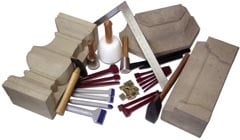Tool order
Many a stonemason has reason to be grateful that Gibson & Co are keeping alive the traditions of tool-making in the UK. And Gibson are also finding a growing appreciation of their specialist tools abroad
Stonemasonry hand tools don’t get a lot of press coverage. After all, they are basically the same as they have been for centuries. But as those making them in the UK have gradually disappeared from the market over the years, those left, such as G Gibson & Co in Leeds, are becoming increasingly important.
Gibson have taken over some of the companies that have disappeared as they have grown over the years – companies such as Smallwood in Birmingham, J G Faulds in Glasgow, Marshalls Hard Metals in Sheffield and Visa Hand Tools in Bristol – expanding their product lines and consolidating production at their factory in Leeds, which, although tools are often hand finished, has its own CNC machines for some of the production processes.
Trevor Timmins branched out on his own in 1986 and heads the company of 11 employees, who include his son, Craige, and general manager Gary Cochrane. Trevor’s background is in the tool-making and engineering firms of Lancashire. It is a background that has given him a passion for the products he makes.
The company’s stonemasonry tools are distributed in the UK by Harbro, Combined Masonry Supplies, National Masonry, BI Crawshaw and Avery Knight & Bowlers. But Gibson’s do not only make tools for stonemasons. They also make tools for other specialist uses – such as for coopers supplying barrels to the whisky industry and for engineers in the oil industry, where the tools have to be brass to avoid sparks, and railways.
They make specialist components for electrical tools and lighting. And if they haven’t got what you want, the chances are they can make it – they have produced one-offs for projects as diverse as Piccadilly railway station and the display of the DeBeers diamond in the Millennium Dome. They have produced little machines for putting chocolate on to choc-ices and small scale tubular bells for school orchestras.
They keep their business at the specialist end of the market to avoid as much competition as possible with imports at the cheap end of the market.
One of the companies they bought, Smith Edge Tools of Oldbury, drop-forged ‘contractor grade’ tools among their range. Gibson quickly dropped it. “We thought: what’s the point? Let’s stay with the very specialist stuff.”
Gibson sold the drop-forging equipment to another company (who still supply them) because they did not have the space and in any case would never have gained planning permission to install it in Leeds, and they did not want to operate two factories.
The takeover scenario was familiar: the owner wanted to retire and had no family prepared to follow him into the business, so he approached Trevor Timmins. The advantage to Trevor was the expansion of his range into specialist hammers and mallets.
Trevor started in business making scutch combs and became so proficient at it that other companies could not compete and decided to leave it to him.
Gibson scutch combs have always been regarded as good quality, but Trevor thinks his main advantage was simply availability. Other suppliers could not always supply them and he made sure he could.
They may not be high value items, but he sells hundreds of thousands of them to stonemasons all over the world – many not even realising they come from Gibson because, like many of the tools the company make, they are own-branded for other manufacturers.
Just lately, after five years of hard work, Gibson have managed to establish themselves in the USA and Canada through nine major tool distributors. In spite of the economic woes in North America, sales have increased there this year. “America doesn’t have tools like we do – theirs are much bigger and heavier – and with the exchange rate in our favour we’re in the driving seat now.”
And it’s just as well, because sales in the UK have plateaued. “We are picking up more and more customers,” says Trevor, “but each one is buying less. Last time there was a recession everyone tried to protect what they’d got. I went out there and attacked the market. We’re doing the same now – we’ve just picked up two new distributors in Australia and one in New Zealand. If something’s falling off the back end of the trailer you have to keep piling more on the front end.”
It is not just distributors who are bringing in extra sales, though. The website, with its on-line store, also now brings increasing numbers of sales. It was created by Trevor’s son, Craige, who also programs the CNCs. It is the next generation of engineers using the next generation of technology to make sure stonemasons will continue to have the tools they need to carry on their trade.

